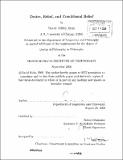Desire, belief, and conditional belief
Author(s)
Etlin, David Jeffrey
DownloadFull printable version (8.634Mb)
Other Contributors
Massachusetts Institute of Technology. Dept. of Linguistics and Philosophy.
Advisor
Robert Stalnaker.
Terms of use
Metadata
Show full item recordAbstract
This dissertation studies the logics of value and conditionals, and the question of whether they should be given cognitivist analyses. Emotivist theories treat value judgments as expressions of desire, rather than beliefs about goodness. Inference ticket theories of conditionals treat them as expressions of conditional beliefs, rather than propositions. The two issues intersect in decision theory, where judgments of expected goodness are expressible by means of decision-making conditionals. In the first chapter, I argue that decision theory cannot be given a Humean foundation by means of money pump arguments, which purport to show that the transitivity of preference and indifference is a requirement of instrumental reason. Instead, I argue that Humeans should treat the constraints of decision theory as constitutive of the nature of preferences. Additionally, I argue that transitivity of preference is a stricter requirement than transitivity of indifference. In the second chapter, I investigate whether David Lewis has shown that decision theory is incompatible with anti-Humean theories of desire. His triviality proof against "desire as belief' seems to show that desires can be at best conditional beliefs about goodness. I argue that within causal decision theory we can articulate the cognitivist position where desires align with beliefs about goodness, articulated by the decision making conditional. In the third chapter, I turn to conditionals in their own right, and especially iterated conditionals. (cont.) I defend the position that indicative conditionals obey the import-export equivalence rather than modus ponens (except for simple conditionals), while counterfactual subjunctive conditionals do obey modus ponens. The logic of indicative conditionals is often thought to be determined by conditional beliefs via the Ramsey Test. I argue that iterated conditionals show that the conditional beliefs involved in indicative supposition diverge from the conditional beliefs involved in learning, and that half of the Ramsey Test is untenable for iterated conditionals.
Description
Thesis (Ph. D.)--Massachusetts Institute of Technology, Dept. of Linguistics and Philosophy, 2008. Includes bibliographical references (leaves 127-132).
Date issued
2008Department
Massachusetts Institute of Technology. Department of Linguistics and PhilosophyPublisher
Massachusetts Institute of Technology
Keywords
Linguistics and Philosophy.